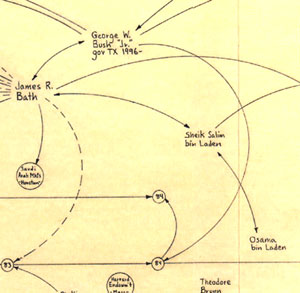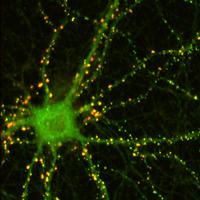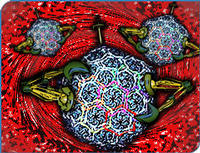|
This is my dynamic, frequently updated homepage. This is a NewsLog, also known as a WebLog or Blog.
Everything is evolving, so don't assume too much.
People to watch:
Adina Levin
Andrius Kulikauskas
Britt Blaser
Catherine Austin Fitts
Chris Corrigan
Clay Shirky
Dan Gillmor
Dave Pollard
David Allen
David Weinberger
Dewayne Mikkelson
Dina Mehta
Doc Searls
Elisabet Sahtouris
Elizabeth Lawley
Euan Semple
Florian Brody
Frank Patrick
Gen Kenai
George Dafermos
George Por
Graham Hancock
Greg Elin
Hazel Henderson
Heiner Benking
Inspector Lohman
Jean Houston
Jerry Michalski
Jim McGee
Jim Moore
John Abbe
John Perry Barlow
John Robb
Joi Ito
Jon Husband
Jon Lebkowsky
Jon Udell
Jonathan Peterson
Judith Meskill
Julian Elvé
Julie Solheim
Kevin Marks
Lawrence Lessig
Leif Smith
Letecia Layson
Lilia Efimova
Lisa Rein
Marc Canter
Mark Oeltjenbruns
Mark Pilgrim
Mark Woods
Martin Dugage
Martin Roell
Mary Forest
Matt Mower
Max Sandor
Michael Fagan
Mike Owens
Mikel Maron
Mitch Kapor
Mitch Ratcliffe
Nathalie dArbeloff
Netron
Noam Chomsky
Paul Hughes
Peter Kaminski
Phil Wolff
Philippe Beaudoin
Ray Ozzie
Raymond Powers
Rebecca Blood
Roger Eaton
Roland Tanglao
Ross Mayfield
Scott Lemon
Sebastian Fiedler
Sebastien Paquet
Skip Lancaster
Spike Hall
Steven Johnson
Stuart Henshall
Thomas Burg
Thomas Madsen-Mygdal
Thomas Nicholls
Timothy Wilken
Todd Suomela
Tom Atlee
Tom Munnecke
Tom Tomorrow
Ton Zijlstra
Lionel Bruel
Loic Le Meur
Nancy White
Mark Frazier
Merlin Silk
Robert Paterson
Colby Stuart
Nova Spivack
Dan Brickley
Ariane Kiss
Vanessa Miemis
Bernd Nurnberger
Sites to watch:
Electronic Frontier Foundation
Co-intelligence Institute
Free Expression Network
Collective Intelligence
Action without borders
Manufacturing Dissent
Explorers Foundation
Disclosure Project
ThoughtsOnThinking
Forbidden Science
Emergent by Design
Greater Democracy
Global Ideas Bank
Independent Media
Space Collective
Friendly Favors
Escape Velocity
Disinformation
Collective Web
WorldChanging
YES Magazine
Disinfopedia
NotThisBody
MetaFilter
Webcamorama
BoingBoing
Smart Mobs
Do No Harm
Imaginify
FutureHi
Openworld
Nanodot
HeadMap
Rhizome
Absara
Edge
Junto
French:
Emmanuelle
Manur
Elanceur
Loeil de Mouche
IokanaaN
Blog d'Or
Le Petit Calepin
GeeBlog
Absara
Guillaume Beuvelot
Ming Chau
Serge Levan
Jean Michel Billaut
C'est pas Mécanique

I live in Toulouse, France where the time now is:
01:08
Unique Readers:

Primarily
Public Domain
Everything I've written here is dedicated to the
Public Domain.

The quotes from other people's writings, and the pictures used might or might not be copyrighted, but are considered fair use. Thus, overall, this weblog could best be described as being:
Primarily Public Domain. |
Syndication:
 ![Validate my RSS feed [Valid RSS]](http://www.newciv.org/pic/valid-rss.png)
|
| Monday, April 21, 2003 |  |
|
|
|
 NY Times reports that an Iraqi scientist is suddenly talking, and saying that Iraq had chemical and biological weapons, but destroyed them a few days before the war. That sounds a bit overly convenient for Bush. Both justifying the war and also justifying why none of the purported 'weapons of mass destruction' are being found. Very clever. Oh, it might be true, but that would have been extraordinarily non-sensical from Saddam's perspective. NY Times reports that an Iraqi scientist is suddenly talking, and saying that Iraq had chemical and biological weapons, but destroyed them a few days before the war. That sounds a bit overly convenient for Bush. Both justifying the war and also justifying why none of the purported 'weapons of mass destruction' are being found. Very clever. Oh, it might be true, but that would have been extraordinarily non-sensical from Saddam's perspective.
And what's with not being able to find Saddam Hussein? If they end up not finding him at all, I'd say there's a pattern forming here. Osama bin Laden was enemy number one, as the supposed mastermind of 9/11. For months everything was about him. He's here, he's there, maybe we got him, maybe he's dead, blah, blah. And suddenly nobody pays any attention any longer, despite that he wasn't found and probably isn't dead.
Same thing with Saddam Hussein. If they don't find him, and the media suddenly loses interest, I'd say something very sinister is going on. It was simply a matter of George W. being business partners with Osama bin Laden, and with Saddam Hussein. Shouldn't be much of a stretch, as his Dad pretty much hired them for their jobs in the first place, as CIA director. So, they did their scripted part, and we have a phoney chase trying to find them for a few months. And then they go into the equivalent of the witness protection program. They get plastic surgery, new passports, a few billion in a bank account, and spend the rest of their lives in underground palaces in Bora Bora. Or they moved on to the black government's bases on Mars for all I know.
[ Opinions | 2003-04-21 14:45 | | PermaLink ] More >
|
|
|
|
 Paul Hughes posts an article by Max Tegmark about several different possible models for the multiverse, involving various scenarios of parallel realities in one form or another. Fascinating reading. Paul Hughes posts an article by Max Tegmark about several different possible models for the multiverse, involving various scenarios of parallel realities in one form or another. Fascinating reading."So should you believe in parallel universes? The principal arguments against them are that they are wasteful and that they are weird. The first argument is that multiverse theories are vulnerable to Occam's razor because they postulate the existence of other worlds that we can never observe. Why should nature be so wasteful and indulge in such opulence as an infinity of different worlds? Yet this argument can be turned around to argue for a multiverse. What precisely would nature be wasting? Certainly not space, mass or atoms--the uncontroversial Level I multiverse already contains an infinite amount of all three, so who cares if nature wastes some more? The real issue here is the apparent reduction in simplicity. A skeptic worries about all the information necessary to specify all those unseen worlds.
But an entire ensemble is often much simpler than one of its members. This principle can be stated more formally using the notion of algorithmic information content. The algorithmic information content in a number is, roughly speaking, the length of the shortest computer program that will produce that number as output. For example, consider the set of all integers. Which is simpler, the whole set or just one number? Naively, you might think that a single number is simpler, but the entire set can be generated by quite a trivial computer program, whereas a single number can be hugely long. Therefore, the whole set is actually simpler. [...]
A common feature of all four multiverse levels is that the simplest and arguably most elegant theory involves parallel universes by default. To deny the existence of those universes, one needs to complicate the theory by adding experimentally unsupported processes and ad hoc postulates: finite space, wave function collapse and ontological asymmetry. Our judgment therefore comes down to which we find more wasteful and inelegant: many worlds or many words. Perhaps we will gradually get used to the weird ways of our cosmos and find its strangeness to be part of its charm. Heheh, that's the cool part. Somebody who proposes anything other than this wonderful infinite unified multiverse will have some serious explaining to do, as to why things would be only that one particular way, rather than ALL ways. I think I'm going to chuckle the rest of the day.
[ Science | 2003-04-21 23:25 | | PermaLink ] More >
|
|
|
|
 Xeni on BoingBoing: Xeni on BoingBoing:If you liked Susannah's BoingBoing guestblog post of yore about The Operation (thanks, Kai), the experimental art-porn film shot with infrared, then you will dig this story about a French (of course) medical researcher using magnetic resonance imaging to observe how female internal anatomy accommodates a penis in a variety of sexual positions. I want pictures. The first BoingBoing reader to score them and post urls in this discuss forum -- or roll their own MRI erotica and post them online-- wins my undying blog-respect.
Update: Boingboing reader "ellison" shares these clinically accurate and decidedly non-prurient links to photographs from an earlier MRI-sex study referenced in the story above. Erotica, they ain't, but MRI images, they are. Link one, link two. > Update Two: aktiv1 shares a link to this very funny testimonial from a female Dutch anthropologist who discusses what it was like to be the subject of an earlier MRI-sex-photography project. Great, science can be a lot of fun. We need to see a movie of course.
[ Inspiration | 2003-04-21 23:57 | | PermaLink ] More >
|
|
| Sunday, April 20, 2003 |  |
|
|
|
 Excellent article from New York Times, The True Cost of Hegemony: Huge Debt. (Registration required). Excellent article from New York Times, The True Cost of Hegemony: Huge Debt. (Registration required).
It examines the strange picture of how the apparent U.S. power is paid for from borrowed funds. And a lot of the money comes from overseas. The U.S. government is now occupying Iraq, but optimistically has set aside hardly any money for reconstructing the country.Can the United States provide the necessary cash, even in the form of private-sector money? The answer is yes — so long as foreign countries are willing to lend it to the United States. For the fact is that America is not only the world's biggest economy. It is also the world's biggest borrower. Its muscular military power is underwritten by foreign capital.
This is an unusual circumstance. In the prime of the European empires, when the British ran much of the Middle East, the dominant power was supposed to be a creditor, not a debtor, investing large chunks of its own savings in the economic development of its colonies. Hegemony also meant hegemoney. Britain, the world's banker before 1914, never had to worry about a run on the pound during its imperial heyday.
But today, as America overthrows "rogue regimes," first in Afghanistan and now in Iraq, it is the world's biggest debtor. This could make for a fragile Pax Americana if foreign investors decide to reduce their stakes in the American economy, possibly trading their dollars for the increasingly vigorous euro. It is an unusual situation. When Britain was playing empire, it was able to do so because it also acted as a bank for the world, and it would invest a big chunk of its capital on overseas infrastructure. When the U.S. took part in the two world wars, and built up Europe with the Marshall Plan, it was all from a position of financial strength, where the U.S. actually had a surplus to take from. But now, since the time of Ronald Reagan, the United States economy is run to a large extent like that of a third world developing country, depending on foreign willingness to invest heavily into it, despite questionable returns.
The only example from the past of a great empire relying on foreign loads is Czarist Russia under Nicholas II. Looked good for while, but eventually it collapsed, from the costs of war, and it collapsed politically and turned into a communist country.
[ Politics | 2003-04-20 12:55 | | PermaLink ] More >
|
|
|
|
From SmartMobs:"Allen the gadgeteer has created a Java app, available for download to a Motorola i88s phone that records your position and uploads the info to a web site every two minutes. The site displays a map of where you are. You can also mark a location to check the map later to see where the spot you marked is. Instructions on how to load and an explanation of how it works are provided." And Richard Soderberg comments:"Combining the current location system with a layer of identity authentication -- friends on your AIM buddy list, for example, that have permission to see where you're at at all times -- or only during the day.
Location as a publicly exposed digital identity; with a button push, you can hide your identity from everyone but your closest friends, or show it to all as an invitation to come talk while you're resting in a bookstore.
It's socially acceptable to present your willingness converse as an ephemeral "status" on instant messenger; may as well tie that in to real life." Yes, I don't see why not. Except for that I might develop some crazy enemies who will use it to program a personal cruise missile for me, I don't personally see much bad about it.
Well, let me think a little more... I don't really mind informing my friends and family of my whereabouts. I would think it would be fun if my weblog readers could find me on a little map. If it can entertain them to figure out I just walked into a strip club in Palm Springs, all the merrier.
But whether I like that for everybody all the time depends on what kind of behavior patterns others develop around me. I have Instant Messenger programs running all the time on my computer, and I don't mind for most people to know I'm online. But some people think that when I'm obviously there, it automatically means I have time to respond to anything they'll feel like sending me. It doesn't. I might want to retain the option of not talking with you, even though I'm not hiding that I'm at my computer. Likewise, some people might think that if my physical location is visible, it means that they can just come and join me. It doesn't mean that.
But we need some better ways of flagging our availability, or for some algorithm to figure it out. I have a hard enough time getting my family to guess who's phone calls I would want to take and who's I don't at any given time.
[ Technology | 2003-04-20 18:59 | | PermaLink ] More >
|
|
|
|
 Weblogsky mentions the late Mark Lombardi who created hand-drawn network maps, which he called "narrative structures". They show the relationships between political figures and financial fraud, criminal activity, busted banks, etc. Weblogsky mentions the late Mark Lombardi who created hand-drawn network maps, which he called "narrative structures". They show the relationships between political figures and financial fraud, criminal activity, busted banks, etc. "At some point in my development," says the artist, "I began to reject reductivist approaches in favor of one capable of evoking the complexity, venality and occasional brutality of the times. What emerged was a study of 'irregular' financial transactions, with special emphasis on those undertaken in secret by select groups of influential yet silent partners." I think there ought to be a well financed team of independent investigatory journalists doing nothing but creating such maps all the time, with supporting information, and posting them on the net. Show us how things connect. Because they do.
[ Patterns | 2003-04-20 23:21 | | PermaLink ] More >
|
|
| Friday, April 18, 2003 |  |
|
|
|

Raymond Powers shows this graph of the budget deficit under different U.S. presidents. It always strikes me as weird that those guys tend to do close to the opposite of what is the stated program of their parties. Republican presidents grow big government like there's no tomorrow, borrowing ridiculous amounts of money, and raised taxes through the root to pay for it. And it is a democrat that actually balances the budget. And hardly anybody notices. People still tend to believe that Republicans stand for smaller government, even though it is as blatantly a lie as it can get.
[ Politics | 2003-04-18 22:28 | | PermaLink ] More >
|
|
|
|
Article by Thom Hartman at Common Dreams. Mentioned at Blog Baby. Last three paragraphs here:"Today, as we face financial and political crises, it's useful to remember that the ravages of the Great Depression hit Germany and the United States alike. Through the 1930s, however, Hitler and Roosevelt chose very different courses to bring their nations back to power and prosperity.
Germany's response was to use government to empower corporations and reward the society's richest individuals, privatize much of the commons, stifle dissent, strip people of constitutional rights, and create an illusion of prosperity through continual and ever-expanding war. America passed minimum wage laws to raise the middle class, enforced anti-trust laws to diminish the power of corporations, increased taxes on corporations and the wealthiest individuals, created Social Security, and became the employer of last resort through programs to build national infrastructure, promote the arts, and replant forests.
To the extent that our Constitution is still intact, the choice is again ours."
[ Politics | 2003-04-18 22:36 | | PermaLink ] More >
|
|
|
|
From Smart Mobs and Boing Boing we hear that Cory Doctorow has submitted comments to the FCC on "Why WiFi is crucial to the First Amendment". He argues that free speech is being limited when available free wireless bandwidth is being limited."I submitted comments to the FCC today on EFF's behalf, asking it to allocate unused TV frequencies to unlicensed use under the same terms as the 2.4GHz spectrum that WiFi runs in. The cool part was, I got to advocate the position that since the FCC is in the business of regulating who gets to speak, and since WiFi shows that with less regulation, more people get to speak, that the FCC has a First Amendment duty to open up more spectrum for WiFi-like uses. The First Amendment calls on government to eschew regulation of who may speak and how they may speak. Historically, the FCC and FRC's regulatory efforts have balanced the restriction of access to spectrum--which is a proxy for speech, since it is an effective medium of expressive communication--with the need to preserve orderliness in the airwaves so that harmful interference is minimized. The paradigm for this governance held that if anyone were allowed to speak in any way, the resulting chaos of harmful interference would result in a world where no one was heard.
The 2.4GHz experiment, which applied an entirely different paradigm--lightly regulating device characteristics, requiring devices to accept all interference, and allowing anyone to operate a compliant device--challenged technologists to create devices that could function in this very different spectrum environment, coping with contention and interference with technology rather than regulation.
The results have been stellar. The 2.4GHz band has spawned unprecedented innovation in devices and protocols, packing 802.11b, 802.11g, Bluetooth, baby-monitors, X10 cameras, and a host of other communications technologies into a narrow slice of spectrum that was once dismissed as a 'junk band'."
[ Technology | 2003-04-18 22:48 | | PermaLink ] More >
|
|
|
|
 Aerobics classes in New York run by a dominatrix. here and here. Hey, why not, I bet those guys get into great shape, and aerobics is a bit like BDSM anyway. Aerobics classes in New York run by a dominatrix. here and here. Hey, why not, I bet those guys get into great shape, and aerobics is a bit like BDSM anyway."If you don't keep up, you get punished," she warned her students at a recent class, which she oversaw with a nonstop string of insults and orders. "I don't want to hear any whimpering. You're here to suffer.
"I expect complete obedience, or I'll give you a good spanking," she said. "Do what I tell you to do. I don't care if it hurts..."
Clad in face masks, dog collars, rubber suits and other sartorial S&M paraphernalia, Mistress Victoria's students run through the exercise regimen, knowing any slacking off will bring her wrath down upon
[ Culture | 2003-04-18 22:55 | 0 comments | PermaLink ]
|
|
| Tuesday, April 15, 2003 |  |
|
|
|
From Seb Paquet, well worth quoting in full: Blue Oxen Associates - that is, Eugene Eric Kim and Chris Dent - had a launch party in San Francisco last week with their first official piece of output: a 20-page research report on how open source communities function. The report features case studies of the communities that have formed around the TouchGraph and SquirrelMail software development projects. It was sponsored by the Omidyar Foundation, the very same foundation that awarded a grant to Tom Munnecke's GivingSpace initiative a few months ago. On the occasion of the launch, Chris wrote a statement of what motivates him in this enterprise. Here it is in full. We live in a time when the decisions of our governments are made outside any appreciation for reasoned and reasonable consensus. Information is delivered to us, packaged, shiny, and full of persuasive power but often lacking in the awareness of past, present and future required to make wise, lasting and honorable decisions. I am tired of this. I'm tired of feeling powerless and listening to my self, my friends and my colleagues, filled with good ideas, swing in and out of a lonely and ineffectual desperation. While it took me some time realize it, helping to start Blue Oxen is my small way of saying I've had enough, it's time to do something. I'm here to suggest that we can make the better world we believe is possible: one where people truly communicate and communicate truly, one where ideas are shared, one where the goodness that is our nature is allowed to emerge, in concert with one another, our neighbors down the street and our neighbors around the world. I want Blue Oxen to catch and enhance the building wave of people who have acknowledged that sharing ideas, openly and frankly, is a creative force for improving the world and for motivating action. I seek not a free marketplace of ideas, but a free community of people collaborating to create and refine new thought. Collaboration is a fully buzzword compliant term these days yet it is still an xx discipline. Eugene and I connected over a casually tossed phrase that I made in response to the question of what is augmentation for. I said, "To make me less dumb." It's now several months later and while I still believe this is an important aspect of what collaboration is for, my close association with Eugene and the members of our first collaboratory and the looser collaboration with disparate voices discovered by the simple act of making some noise has revealed a larger focus: Less dumbness emerges from open communication. When the internet reached the public, it was hailed as a compelling democratizing force. The power of personal publishing was going to alter the face of society. It didn't quite happen like that. I remember being disillusioned as the significance of my own web server faded in the face of the shine, the gloss and the money of centralized media. We are, today, thanks to motivated and idealistic people, in a new phase of enthusiasm. Systems such as weblogs and wikis and the developing genre of social software are birthing dynamic social networks that produce new understandings. In and of themselves these tools are nothing, it is the people who use them and what they do with them that matters. People are exploring, communicating, generating and accepting feedback; using their freedom to generate more freedom. I want Blue Oxen to be an experimental gardener in this realm. Our task is to participate in the discovery, engenderment, development, evolution and facilitation of the patterns of behavior and process—and the tools the patterns use—that bring the ecology of collaborative evolution we need as a society. Our challenge is to see that the communication facilitated by collaborative systems continues, stays open, and creates artifacts that are accessible and reusable by others. Openness leads to shared and knowledgeable understanding, shared understanding leads to shared goals. Goals lead to motivation and motivation leads to action. Let's do what we can. Chris is interested in the politics of collaboration, which seems like a hugely interesting topic. A later post of his is titled Anarchic Emergent Collaboration, and reflects on the ways in which we structure collaboration. Chris speculates that "emergent and loose collaboration is the most natural style." (which seems to resonate fairly well with Chris Corrigan's musings on Open Space Technology). Chris Dent writes, "So I wonder if there are threads of connection that we can draw between extremist political theory (and history), systems theory and discussions of collaboration. Even if the threads prove ephemeral the exploration will probably be productive." Right on. Count me in on the revolution.
[ Culture | 2003-04-15 13:57 | | PermaLink ] More >
|
|
|
|
 In relation to the plundering of the Baghdad Museum of Antiquities Scott Rosenberg says: In relation to the plundering of the Baghdad Museum of Antiquities Scott Rosenberg says:"For a war that wasn't about oil...
I imagine the planners in Washington consider the looting that has wrecked Iraqi cultural edifices, including the legendary National Museum of Antiquities in Baghdad, in the wake of the U.S. "liberation" to be so much minor "collateral damage" -- eggs that have to be broken to make the omelette, that sort of thing. "Regrettable," you know. "Can we move on to the next question?"
But I can't help thinking about this: While U.S. forces were unable to protect museums in Baghdad (or Mosul, as Salon's Phillip Robertson reported) from looting crowds destroying millennia-old artifacts, it seemed to have plenty of troops available to protect the Iraqi oil ministry in Baghdad. And of course seizing and protecting the oil fields in both southern and northern Iraq was not beyond the capacity of our forces. Priorities are priorities!" Raven mentions some of what was lost. Scroll down. The picture is a mask of the Mesopotamian goddess Inanna. 5,500 years old and one of the earliest known examples of representational sculputure. The list is long. 10's of thousands of items. Well, some of them will come back, I'm sure, after spending years in somebody's garage. But it is a mess.
[ Culture | 2003-04-15 14:22 | | PermaLink ] More >
|
|
| Monday, April 14, 2003 |  |
|
|
|
Tim Berners-Lee, creator of the World Wide Web, says in his book Weaving the Web:"We ought to be able not only to find any kind of document on the Web, but also to create any kind of document, easily. We should be able not only to follow links, but to create them - between all sorts of media. We should be able not only to interact with other people, but to create with other people. Interactivity is the process of making things or solving problems together. If interactivity is not just sitting ther passively in front of a display screen, then interactivity is not just sitting there in front of something 'interactive'." To which Sebastian Fiedler says:"So, why is nobody in the eLearning realm reading Tim Berners-Lee? How come that so many people see the Web mostly as a large distribution and retrieval system? They see designers, creators, domain experts, etc., on one side ... and loads of consumers on the other. Hm... if I think about it... that last sentence reminds me somewhat of schools..." Yeah, if instead we can figure out how to trigger rampant creativity and spontaneous cooperation - that would be something. Life is too short to leave the design of it to an elite.
[ Organization | 2003-04-14 20:44 | | PermaLink ] More >
|
|
|
|
I consider what I write here in my weblog to be in the public domain. I.e. anybody can copy it and reproduce it anyway they see fit. Doc Searls mentions that he wants his blog to be in the public domain. See a Public Domain Dedication from Creative Commons. The problem is that it is not as easy as one might think to put one's work into the public domain. It is not just as simple as writing a few words under one's text, or even linking to a declaration like that. CC can take you through some steps that will make it more likely that you actually succeed in putting something into the public domain.
It is pretty silly. In most parts of the world the default choice is not that creative works are shared, but that they're hidden and protected behind legal red tape. So you need to jump through some hoops just to be allowed to give your own work away. I've noticed that with my own writings. It doesn't matter how clearly I write that anybody can copy it and distribute it and use it as much as they feel like. Lots of people still think they need to write and ask for permission to use it. Publishers still send me complicated release forms, just because they want to quote something I wrote.
[ Knowledge | 2003-04-14 21:00 | | PermaLink ] More >
|
|
|
|
 Greg Bear is one of my very favorite science fiction writers. He also has a good grasp of the science part. Recently he's been looking at evolution. FuturePositive has an article The New Biology he wrote recently. Greg Bear is one of my very favorite science fiction writers. He also has a good grasp of the science part. Recently he's been looking at evolution. FuturePositive has an article The New Biology he wrote recently."The unfortunate aspect of the rancorous debate on evolution in the last seventy or more years has been the fossilization of hypotheses. One side says "God and God only," the other says, "Random mutations and natural selection and nothing more." Both are likely wrong. A third variety of "intelligent design" has long been awaiting our attention. Many evolutionary biologists have built their careers on foundations that are erroding rapidly. Specifically that biology and evolution can be reduced to simple mechanistic behaviors, and random stumbling around. Now extraordinary things are being discovered, such as DNA rearranging itself in ways that are nothing like random. And DNA being exchanged in other ways than sexual reproduction. Bear puts forward the hypothesis that computational DNA communicates in various ways, through pheromones, viruses and sexuality; incorporating, selecting and editing genes, as part of a species-wide neural network, solving problems in much vaster scales than science previously anticipated. Regardless of what exactly it is found to be, something big is being discovered. "Some refer to this burgeoning new view as "systems biology." For many conservatives in biology, the changes are heartbreaking, even infuriating. But the evidence has been mounting for decades, and clear signs of the necessity for radical change has been evident for over fifty years. Arthur Koestler fought reductionism in psychology and biology from the 1950s to his death.
We're facing a true paradigm shift. Is that surprising? Did anyone actually believe we had all the answers to something as marvelous and complex as life and evolution?
That organisms exchange genes through other than sexual means is now irrefutable for metazoans as well as microbes. Retroviruses, and now perhaps bacteria, may well serve as vectors for such exchanges. Commensal bacteria in our intestines commonly interact with our tissues. Surprisingly, there appear to be mechanisms in most organisms for evaluating and either destroying or utilizing RNA from outside sources, including retroviral sources. This evaluation process is extremely important, and understanding it may be key to understanding how the genome works in both individuals and in populations.
The "selfish gene" is certainly a valid concept in some instances, but not in the vast majority. Rather, because genes rely on interaction with many other genes-hundreds in some cases-to be effective, they are less like competitive rogues than tame office-workers. The "social gene" becomes a better model. And in fact the social aspects of the genome have been championed for decades by brave molecular biologists and geneticists, including Lynn Margulis.
Altruism in societies is well demonstrated, and rationally quite defensible. That genes operate in their own societies, and that species both compete and collaborate in those larger societies called ecosystems, functioning as nodes in an extended neural net, makes the problem of cooperation and altruism far more tractable.
Random processes are also at work in evolution, quite clearly, leading to either uncorrected errors or serendipitous discovery-but I do not think that we can any longer support random mutation as the sole cause or even the major cause of variation. Darwin himself deliberately avoided subscribing to chance as the sole cause of variation, thus leaving the actual cause to be discovered in the future. Later generations leaped in well before the facts were available, and cemented the hypothesis, slowing the pace of biological discovery by actively discouraging alternatives.
A similar reductionist slow-down happened in psychology with Behaviorism, whose central tenets are now largely discredited." I never quite understood how well-meaning intelligent people could seriously conclude that life is the result of randomness-and-accidents-all-the-way-down. Maybe a reaction to a strict religious upbringing or something. I think we're going to find that the truth is much more satisfying all the way around.
[ Science | 2003-04-14 21:45 | | PermaLink ] More >
|
|
| Sunday, April 13, 2003 |  |
|
|
|
 L'oeil de Mouche comments (in French) on weblogs working like neurons. A weblog links with other sites in a similar fashion as a neuron does. The links are potentials for action. Something might or might not come out of them. They might or might not be followed. They might or might not add up to any coherent picture of anything. All the incoming data to a neuron do not necessarily add up to that neuron producing an outgoing signal. But if the sum of the incoming potentials cross a certain threshold, a new outgoing signal is generated. L'oeil de Mouche comments (in French) on weblogs working like neurons. A weblog links with other sites in a similar fashion as a neuron does. The links are potentials for action. Something might or might not come out of them. They might or might not be followed. They might or might not add up to any coherent picture of anything. All the incoming data to a neuron do not necessarily add up to that neuron producing an outgoing signal. But if the sum of the incoming potentials cross a certain threshold, a new outgoing signal is generated.
If several neurons are in sync, suddenly their signal starts being detectable. Multiple weblogs focusing on the same matter adds up to a noticable resonance - a synergy. That is like the concept of 'synaptic plasticity'. Hebb's learning postulate says essentially:Whenever neuron A fires, and neuron B fires soon afterwards, the synaptic efficacy increases. So, if two neurons are active at roughly the same time, the connection between them is strengthened.
Likewise, if several weblogs happen to be focusing on the same subject at roughly the same time, the connections between them get strengthened. For that matter, it generally works like that between people. If you and I often happen to be activated in a certain way at the same time, like being interested in the same subject at the same time, or having similar experiences, and we notice that, chances are we'll have a stronger link between us in the future. It will be more likely that I'll check in with you before others who have less of a history of being in sync with me.
But, indeed, in the human body the neurons are part of an organism with a common purpose, of making that organism function well. Whereas weblogs and people having chance encounters do not have a pre-defined common purpose. The connections perhaps serve to discover shared purposes, rather than just carrying out existing purposes more efficiently?
[ Organization | 2003-04-13 16:00 | | PermaLink ] More >
|
|
|
|
 From Abstract Dynamics William Blaze writes: From Abstract Dynamics William Blaze writes:"The Bush Administration's media manipulation skills never ceases to amaze me. As the war in Iraq skewers away from the chickenhawks dream plans its starting to become clearer just how the Karl Rove media technique works. Its all pretty simple really, it can be broken down into 3 steps:
1. Keep the message simple
2. Keep the details secret
3. Never admit you are wrong
Follow those steps and you look like you are doing a good job in the mass media. Up close or under close scrutiny all the lying and bullshitting the administration engages in is pretty evident. But when broadcast over mass media it looks like the administration is right on track.
Never admitting you are wrong is the most important step. Once you admit you are wrong your words become circumspect when broadcast. Bush always maintains that things are going well, and because he never entertains the possibility of being wrong, he projects and image of being right and believable. Not everyone buys it off course, but in the mass media and winner takes all democracy all you need is a healthy percentage of the population to buy it.
Clinton used this technique as well, but not quite as deftly as Bush. Clinton's problem was the details, he was too willing to dig into them. Once the details are out its harder to maintain the image of always being right. And Clinton missed the secrecy as well, Bush keeps as much info secret as possible so there are less details to complicate the projection of being right.
Perhaps the greatest tactical failing of the Bush administration is the way they've let the success of these media techniques infect their attempts at diplomacy. These techniques work when broadcast in the media, as I said before they fail completely when used up close and in person. They just don't work in diplomacy, hence the outrageous failings of the Bush administration in the UN, Turkey and elsewhere." He's right. Works like a charm in broadcast media, when speaking to large numbers of people who are only going to pay attention for a few minutes anyway. Works much less well on the net, where people can amplify the discrepancies. But it works horribly when dealing with other governments that most all have the intelligence resources to be able to add up the facts on their own.
[ Politics | 2003-04-13 21:26 | | PermaLink ] More >
|
|
| Friday, April 11, 2003 |  |
|
|
|
Conference call and online chat today in the Joi Ito instigated group on Emergent Democracy. It is a multi-track thing where we're both talking on the phone and writing in a chat room, and organizing around some wiki pages. And in-between those events are mailing list discussions. Which I haven't gotten around to participating in much. On the table today was the potential of a Journal of Emergent Democracy for peer reviewed papers on the subject. The definition of 'Emergent Democracy' - a subgroup was put on that task. Kevin Marks' suggestion of 'vote links', web links that include a tag describing whether one recommends what one is linking at, or one recommends against it, or there is no judgement about it. Suggestions for a Social Software Alliance, to discuss possible new standards, from Pete Kaminski. And a few other subjects.
[ Diary | 2003-04-11 23:59 | 0 comments | PermaLink ]
|
|
|
|
 At this evenings meeting of the L.A. futurists group the speaker was Dr. Carlo Montemagno who runs the Department of Bioengineering and Biomedical Engineering at UCLA. He is a pioneer in hybrid biotech. Nanoscale Biological Engineering. Very impressive. Instead of trying to build little machines one atom at a time, which are very unstable, the idea is to do it more like nature's way. Get the right kind of proteins together under conditions where they'll follow simple rules consistently and do useful things. The 'hybrid' approach is doing nanotech with biological components. They're making good progress with something sort of like remote controlled slime molds. See this site. At this evenings meeting of the L.A. futurists group the speaker was Dr. Carlo Montemagno who runs the Department of Bioengineering and Biomedical Engineering at UCLA. He is a pioneer in hybrid biotech. Nanoscale Biological Engineering. Very impressive. Instead of trying to build little machines one atom at a time, which are very unstable, the idea is to do it more like nature's way. Get the right kind of proteins together under conditions where they'll follow simple rules consistently and do useful things. The 'hybrid' approach is doing nanotech with biological components. They're making good progress with something sort of like remote controlled slime molds. See this site.
[ Science | 2003-04-11 23:59 | 0 comments | PermaLink ]
|
|
| Thursday, April 10, 2003 |  |
|
|
|
 What is emergent direct democracy? It is just many people being free to make choices, and the aggregate result of that, and the hope that the result can be fairly coherent. What is emergent direct democracy? It is just many people being free to make choices, and the aggregate result of that, and the hope that the result can be fairly coherent.
Democracy is that the people decide things - that they choose what they want. In most countries in the world, that has been reduced to a ritual of every few years letting the people choose among some candidates, and the individuals they elect will then make most of the big important choices for the following years. If that is at all worthy of being called 'democracy', it certainly isn't direct democracy, and there isn't either anything very emergent about it. Yes, if the people really, really, really want things to be different, and they manage to mostly agree on that, they can start a revolution of some kind, elect somebody different from what they're offered, or force the ground rules to be changed. But there's a very high threshold to that, and it is mostly avoided by keeping people dispersed, busy, but moderately content.
Now, what would be all different would be if the democracy really consisted of all of us making choices, all the time. Not one choice per four years, but probably several or many choices per day.
[ Organization | 2003-04-10 12:07 | | PermaLink ] More >
|
|
|
|

One of Edward de Bono's numerous contributions to the discipline of creative thinking is the six thinking hats.
The idea is basically that you are aware of what thinking and communication mode you are in - what hat you are wearing. That puts things in perspective, sorts statements in a meaningful way, and makes it less likely that people misunderstand each other. E.g. if you're wearing the black hat, you might be playing devil's advocate, and put attention on things that might not work. If that is clear, and announced up front, it is likely that people will take less offense to the criticism, and it is more likely to be useful. If you announce you're wearing a red hat, irrational emotional outbursts are more acceptable, and don't necessarily have to be analyzed logically. Etc. You can have a meeting using that system. Or you can use it in brainstorming, to categorize different kinds of ideas.
Below is a more detailed explanation:
[ Knowledge | 2003-04-10 13:39 | | PermaLink ] More >
|
|
|
|
 Elisabet Sahtouris speaks lucidly about how life works, how evolution works, and how we can learn great lessons from the intelligence of nature. Here's from a small article on the Evolution of Governance: Elisabet Sahtouris speaks lucidly about how life works, how evolution works, and how we can learn great lessons from the intelligence of nature. Here's from a small article on the Evolution of Governance:"In studying the Earth's evolution, the most fascinating story I know is that of ancient beings who created an incredibly complex lifestyle, rife with technological successes such as electric motors, nuclear energy, DNA recombination and worldwide information systems. They also produced - and solved - devastating environmental and social crises and provided a wealth of lessons we would do well to consider." That was two billion years ago, mind you. And we're not talking about extra-terrestrials, we're talking about our earthly ancestors, one celled microbes. Despite literally having no brains, they faced crisises very similar in structure to what we face today, and they developed peaceful synergetic solutions."Their crisis came about when food supplies were exhausted and relatively hi-tech respiring bacteria ("breathers" with electric motor drives) invaded larger more passive fermenting bacteria ("bubblers") to eat their insides out - a process I have called bacterial colonialism or imperialism. The invaders multiplied within these colonies until their resources were exhausted and all parties died. No doubt this happened countless times before they learned cooperation.
Somewhere along the line, the bloated bags of bacteria also included photosynthesizers, "bluegreens," which could replenish food supplies if the motoring breathers would push the enterprise up toward a lighter part of the primeval sea. Perhaps it was this lifesaving use of solar energy that initiated the shift to cooperation.
In any case, bubblers, bluegreens, and breathers eventually contributed their unique capabilities to the common task of building a workable society. In time, each donated some of their "personal" DNA to the central resource library and information hub that became the nucleus of their collective enterprise: the huge (by bacterial standards) nucleated cells of which our own bodies and those of all Earth beings other than bacteria are composed.
This process of uniting disparate and competitive entities into a cooperative whole was repeated when nucleated cells aggregated into multi-celled creatures. Once these biological "governments" evolved, they continued to function beautifully. What nature's healthy bodies and ecosystems exemplify are beautifully unified democracies of diversity, organized by locally productive and mutually cooperative "bioregions," and coordinated by a centralized service government. The underlying and overriding motive is toward healthy production and consumption for all." And, if it isn't already clear, your body is one of the results. A democratic cooperative society of billions of individual beings.
Now, the question is, do you really want to come across as being more stupid than the bacteria in your intestines? It would be a bit embarrassing if we big complex beings with huge brains couldn't even figure out how to organize ourselves in a viable manner. If we're really stupider than the parts we're made of. Particularly when a several billion year unbroken succession of our ancestors has succeeded inpeccably until now.
[ Organization | 2003-04-10 16:02 | | PermaLink ] More >
|
|
| Wednesday, April 9, 2003 |  |
|
|
|
 How do we invite democracy to emerge? How does spontaneous cooperation happen? How can humanity self-organize in more useful ways? How can we make our civilization more synergetic? How do we invite democracy to emerge? How does spontaneous cooperation happen? How can humanity self-organize in more useful ways? How can we make our civilization more synergetic?
I am here particularly interested in how we can use our existing or almost existing technologies to arrange our information and our means of communicating in such a manner as to invite these things to happen.
My instinct is that our society could be organized in a drastically different way, from the bottom up, in a way that will allow just about all of us to do productive work that we are happy with, and in a way that is vastly more productive as a whole. If we just knew how.
I believe our information networks could provide some core leverage in getting us there, but they aren't yet. It is kind of like we're almost ready to operate collectively at a much higher level, but we're still communicating with tin cans connected with string, and we all have paper bags over our heads, so we can't do anything very complex together, except for rather clumsily and haphazardly.
[ Knowledge | 2003-04-09 02:34 | | PermaLink ] More >
|
|
|
|
Lee Felsenstein is an Internet oldtimer and activist. Here's a thing from his weblog:"HOW TO MAKE A REVOLUTION in three easy steps
OK, here's the method for making sweeping, positive social change.
FIRST, everybody gets a project.
Join one or start one, but the project has to be directed toward making things better. That's what's called a "positive vector".
SECOND, everybody talks with everybody else about their projects.
That's "talks with", not just "talks to" or "talks at". This sets up a "field of communication", with information flowing in all directions. It's very important to the process, and we now have the tools (the Internet and the phone system) to make communication available without much hierarchy.
THIRD, be prepared to change your project based upon what you learn by communicating about it.
This is also very important. It "closes the feedback loop" by making the communication consequential, and, with everyone's good sense, sets up a "converging system" in the general direction of the vector.
That's it. Act, especially in concert with others, communicate and re-evaluate. Repeat as often as possible. Oh, yes - keep records of what you try and what happened , both good and bad. The system needs an element of memory to function. " OK. Organization based on each person actually having something meaningful to do, and on a process of continuous dialogue.
[ Organization | 2003-04-09 23:59 | | PermaLink ] More >
|
|
| Tuesday, April 8, 2003 |  |
|
|
|
 Jim Moore elaborating on his Second Superpower meme: Jim Moore elaborating on his Second Superpower meme:"How do we strengthen the Second Superpower? What are the next vital developments we need to make? Are there one or two things which, if accomplished, would enable more rapid and fuller evolution of emergent democracy and the second superpower? Are these spiritual, technical, political, or in our collective mindset?
In ecology there is a sub-field called "assembly rules" that seeks to understand the combinations of species that are required for a functioning ecosystem. The field goes farther and looks for the sequences by which a few species can establish a foundation on which others can grow. Aspen trees stabilize nitrogen in the soil, making a place for hardwoods to follow. Lichens break down volcanic rocks into a primitive soil, mosses and ferns follow.
I wonder, what are the assembly rules for emergent democracy?" Ah, yes, yes, that's the kind of questions we need to delve into. Recipes for generative diversity.
[ Organization | 2003-04-08 23:00 | 0 comments | PermaLink ]
|
|
|
|
 Sheldon Pacotti writes in Salon about whether or not we're doomed based on the fairly inevitable direction of technology towards much more pervasive ways of keeping an eye on all of us, and scary possibilities for destruction, beyond anything we've seen before. He particularly speaks to the discussion on whether governments should try to stop certain kinds of knowledge from being generally available. Sheldon Pacotti writes in Salon about whether or not we're doomed based on the fairly inevitable direction of technology towards much more pervasive ways of keeping an eye on all of us, and scary possibilities for destruction, beyond anything we've seen before. He particularly speaks to the discussion on whether governments should try to stop certain kinds of knowledge from being generally available."The computer-networked, digital world poses enormous threats to humanity that no government, no matter how totalitarian, can stop. A fully open society is our best chance for survival." Yeah, I agree. There's really no way of stopping it, so we need to expand our collective ability to solve problems, our collective intelligence, at least as fast as the speed that new technologies are developed at. The author talks about various sectors of society where governments might think they ought to hold on to all the knowledge. Like, surveillance. If there are cameras everywhere, do we trust government agencies with deciding what to do with what they see? No, of course not. If there has to be surveillance, the only safe thing is if it easily available to all of us."If we must submit to a surveillance society, I think it is clear that an open network, in which no group, agency, or individual is privileged over any other, would lead to a society with a superior character than one in which the citizens remain separate from and observed by the government. Better for us all to be able to watch one another than for the "authorities" to monopolize this power and leave us with only the fear." He then goes on to talk about technologies like nano-tech or genetic engineering, which quite likely might allow individuals or small groups to produce results that could kill every last one of us on the planet. How do we guard against that? Stop that kind of research? Bill Joy suggested something like that. But, no, that ain't gonna happen. There will always be some groups, military, religious, terrorist, or whatever, who will want to do it anyway. So, the question is what is most secure - share information widely, or try to keep it secret. That's the same argument that applies to computer security. Microsoft advocates to just keep all security problems really quiet and everything will be fine. The Open Source world advocates to put everything out in the open, and thousands or millions of people can all help finding the holes and plugging them. Possibly the same thing applies to other technologies."What happens, in a police bureaucracy, if someone releases a nanotech plague into the environment? If the police can suppress information on the structure of the nanobots, then only a handful of government bureaus and hand-picked researchers may be allowed to work on a cure. Millions could die waiting for the bureaucracy to solve the problem. On the other hand, if the molecular structure of the pest is published worldwide, anyone with the expertise could help design defensive technology." I'd lean in that direction. But then again, would that apply to, for example, nuclear weapons? If we all knew how to make hydrogen bombs, would some of us figure out how to make an antidote against them?
[ Knowledge | 2003-04-08 23:37 | 0 comments | PermaLink ]
|
|
<< Newer stories Page: 1 ... 60 61 62 63 64 ... 97 Older stories >> |
|

This is a collage of things that catch my eye, things that need to be said, and stuff I really care about
TRUTH
BEAUTY
FREEDOM
LOVE
TECHNOLOGY
|
| Mon | Tue | Wed | Thu | Fri | Sat | Sun |
|---|
|
|
|
|
|
|
1 |
| 2 |
3 |
4 |
5 |
6 |
7 |
8 |
| 9 |
10 |
11 |
12 |
13 |
14 |
15 |
| 16 |
17 |
18 |
19 |
20 |
21 |
22 |
| 23 |
24 |
25 |
26 |
27 |
28 |
|
|




